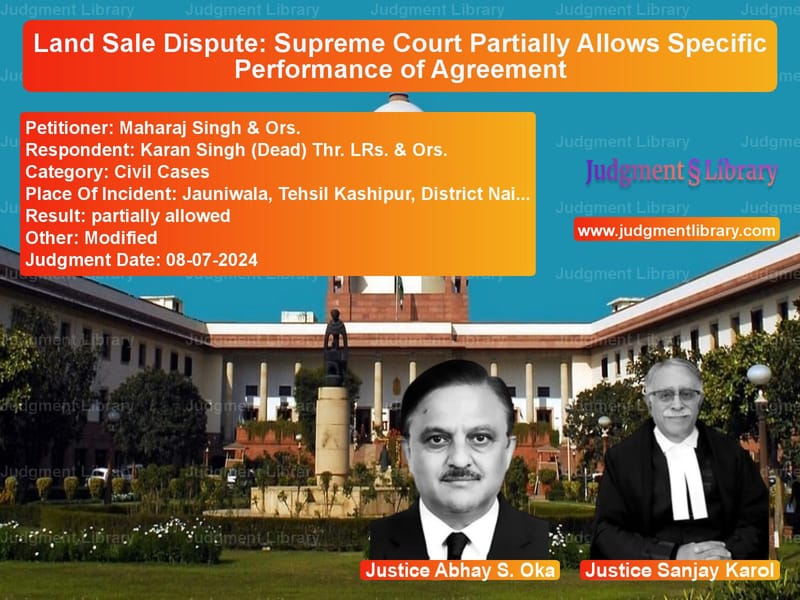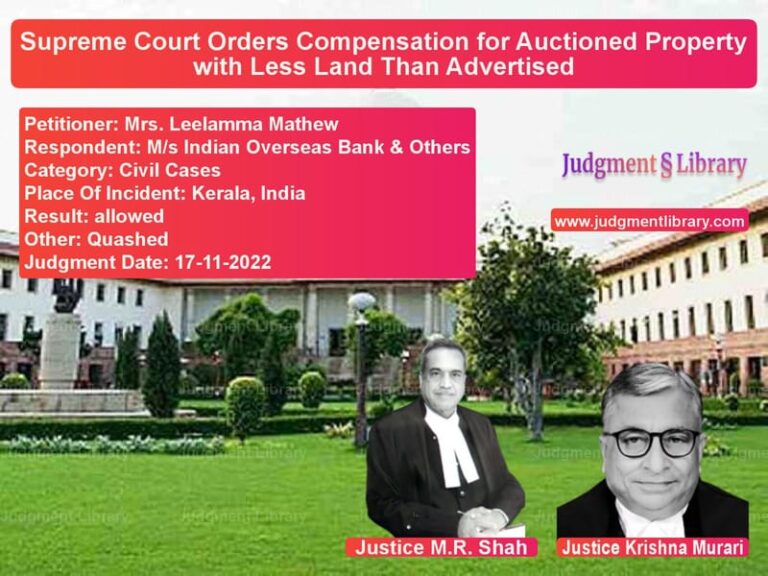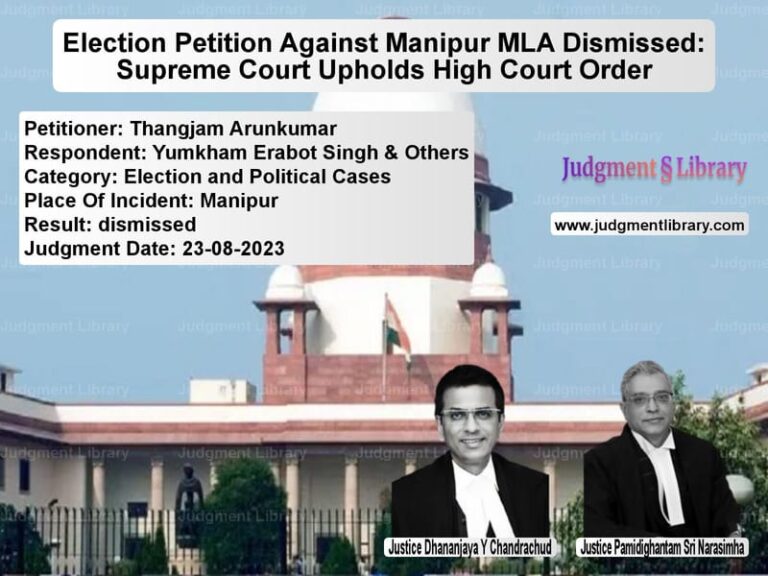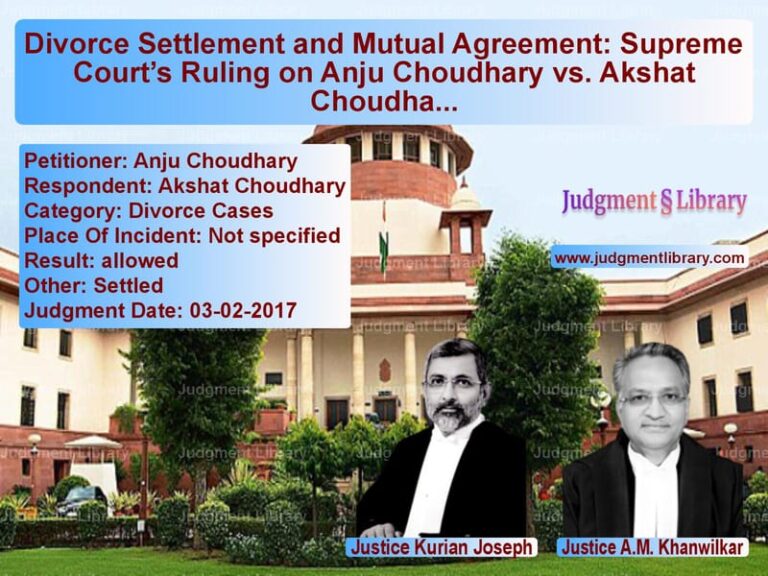Land Sale Dispute: Supreme Court Partially Allows Specific Performance of Agreement
The case of Maharaj Singh & Ors. vs. Karan Singh (Dead) Thr. LRs. & Ors. is a significant land dispute concerning specific performance of a sale agreement. This Supreme Court ruling, delivered on July 9, 2024, provides critical insights into property transactions, bona fide purchaser rights, and legal obligations in executing sale agreements. The judgment also examines the limitations of contesting a written contract under the Indian Evidence Act and Transfer of Property Act.
Background of the Case
The dispute originated from an agreement for sale executed on December 7, 1981, by the first defendant, who agreed to sell his Bhumidhari land (2.90 acres in Khasra No. 48, Village Jauniwala, Tehsil Kashipur, District Nainital) to the plaintiffs for Rs. 20,300. The agreement mentioned an advance payment of Rs. 7,000, with the remaining amount to be paid upon execution of the sale deed within three years.
However, instead of executing the sale deed, the first defendant sold portions of the land to other parties:
- September 6, 1983: 1.60 acres sold to the second and third defendants.
- December 12, 1983: The remaining land sold to the second to fourth defendants.
Upon learning of these transactions, the plaintiffs filed a suit for specific performance on December 17, 1983, seeking execution of the sale deed and possession of the land.
Defendants’ Arguments
Separate written statements were filed:
- The legal representative of the first defendant claimed the sale agreement was fictitious and executed merely to prevent the first defendant from selling the land.
- The second and third defendants alleged that the sale agreement was forged and was never meant to be acted upon.
- They further argued that they were bona fide purchasers who paid consideration in good faith without knowledge of the prior agreement.
Findings of Lower Courts
The Trial Court ruled in favor of the plaintiffs, holding:
- The execution of the sale agreement was proven.
- The defendants could not contest the agreement’s validity due to Section 92 of the Indian Evidence Act.
- The second to fourth defendants had constructive notice of the sale agreement since it was a registered document.
- The plaintiffs demonstrated readiness and willingness to complete the transaction.
- A decree for specific performance was granted, directing execution of the sale deed and possession transfer.
The Additional District Judge, Nainital, upheld the Trial Court’s findings.
The Uttarakhand High Court dismissed the second appeal, affirming the concurrent findings.
Supreme Court’s Analysis
The Supreme Court framed several key legal issues:
1. Was the Sale Agreement Sham and Bogus?
- The Court rejected the claim that the agreement was fictitious.
- It held that under Sections 91 and 92 of the Evidence Act, oral evidence contradicting a written contract is inadmissible unless fraud or forgery is proven.
- The Court noted inconsistencies in the defense: while one set of defendants claimed the agreement was a deterrent, others alleged it was forged.
2. Were the Subsequent Buyers Bona Fide Purchasers?
- The Supreme Court upheld the Trial Court’s ruling that since the sale agreement was registered, the subsequent purchasers had constructive notice.
- The second to fourth defendants failed to conduct due diligence before purchasing the land.
- Thus, they could not claim bona fide purchaser protection.
3. Could Specific Performance Be Granted Without Cancelling Subsequent Sale Deeds?
- The Court reaffirmed the precedent set in Lala Durga Prasad v. Lala Deep Chand (1953), stating that specific performance can be enforced without canceling subsequent sales.
- The subsequent buyers must join in executing the sale deed but are not required to assume additional contractual obligations.
4. Did the Zamindari Abolition Act Bar the Sale?
- The Court ruled that while the Act restricts land sales to non-agriculturists, it does not prohibit agreements for sale.
- However, the sale could proceed only if necessary permission was obtained.
Supreme Court’s Judgment
The Supreme Court modified the lower courts’ decrees:
- The first plaintiff was granted specific performance for half of the land since the second plaintiff had withdrawn his claim.
- The defendants were directed to apply for necessary government permission for the sale.
- If permission was denied, the first plaintiff would be entitled to a refund of Rs. 7,000 with interest.
- The first plaintiff could not seek possession through this decree but could file a separate suit for partition.
Key Takeaways
- Registered Agreements Are Binding: Courts presume the authenticity of registered documents.
- Bona Fide Purchaser Protection Has Limits: Constructive notice can negate such claims.
- Specific Performance Can Be Enforced Without Canceling Subsequent Sales: Subsequent buyers must join the sale deed execution.
- Sale Restrictions Can Be Addressed by Court Orders: Permission clauses in decrees ensure compliance with land laws.
Conclusion
This judgment highlights the significance of due diligence in property transactions and upholds the sanctity of legally binding agreements. It also clarifies the procedural approach to executing sale deeds in compliance with statutory restrictions.
Petitioner Name: Maharaj Singh & Ors..Respondent Name: Karan Singh (Dead) Thr. LRs. & Ors..Judgment By: Justice Abhay S. Oka, Justice Sanjay Karol.Place Of Incident: Jauniwala, Tehsil Kashipur, District Nainital.Judgment Date: 08-07-2024.
Don’t miss out on the full details! Download the complete judgment in PDF format below and gain valuable insights instantly!
Download Judgment: maharaj-singh-&-ors.-vs-karan-singh-(dead)-t-supreme-court-of-india-judgment-dated-08-07-2024.pdf
Directly Download Judgment: Directly download this Judgment
See all petitions in Property Disputes
See all petitions in Contract Disputes
See all petitions in Specific Performance
See all petitions in Judgment by Abhay S. Oka
See all petitions in Judgment by Sanjay Karol
See all petitions in partially allowed
See all petitions in Modified
See all petitions in supreme court of India judgments July 2024
See all petitions in 2024 judgments
See all posts in Civil Cases Category
See all allowed petitions in Civil Cases Category
See all Dismissed petitions in Civil Cases Category
See all partially allowed petitions in Civil Cases Category







